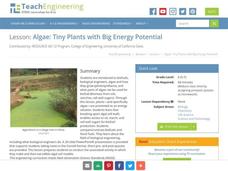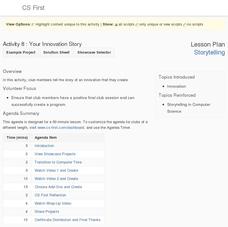DiscoverE
Clean It Up
Water, water, everywhere, but not a drop to drink—until we clean it, of course! Scholars design a filtration device that removes pollutants from water. The goal is to have the water come out as clean as possible from the device. How...
DiscoverE
Sun-Warmed Treats
Treat your class to a fun activity, complete with treats. Groups create a solar oven from a pizza box. They then use it to heat up some food ... that's what an oven is for, after all!
DiscoverE
A Clever Way to Water
Your plants will survive without you. Scholars create a device that can water plants using a coiled string. Along the way, they learn about adhesion and cohesion of water. The challenge is to keep the plants alive for at least a week.
DiscoverE
Wind Farm
A wind turbine is essentially just a giant pinwheel, right? Individuals first create pinwheels from paper, pins, and pencils. In groups, they model a wind farm along a coast and then test out their designs using an electric fan.
DiscoverE
Product Dissection
Sometimes, taking things apart is more fun than putting things together. Groups of learners participate in a reverse engineering activity. They dissect a device of their choosing to see how it works—great hands-on learning from the...
DiscoverE
Textbook Support Challenge
Textbooks are heavier than a sheet of paper, so how can paper hold up a textbook? Young engineers create a structure out of paper that can support a textbook. To add another wrinkle, they must stay within budget and time constraints.
DiscoverE
Slime!!
Who's going to get slimed? Your entire class! Scholars create slime using Borax, water, and white glue. Some food coloring can give the slime a bit of color.
DiscoverE
Build a Bridge
Cost overruns are unacceptable—in the real world and in an engaging activity. Groups of pupils get together to build a bridge out of straws, paper cups, and tape. They keep track of costs ($1,000 for each material) and must stay within a...
Teach Engineering
Algae: Tiny Plants with Big Energy Potential
My, what big energy potential you have! Scholars learn about the energy potential of using algae as a biofuel. A PowerPoint presentation first describes the structure of algae and then how researchers use algae as biofuel to produce energy.
Kenan Fellows
Engineering Skills Through Problem Based Learning
Navigate the ups and downs of learning about energy. Future engineers consider how potential and kinetic energy apply to roller coasters. They design a roller coaster of their own and then use computer design software to showcase their...
Kenan Fellows
Analyzing Speed from Different Modalities
Show us your moves. Using sensor equipment, scholars track the motion of different movements, such as jogging, skipping, or jump roping. They analyze velocity and acceleration and create graphs representing each movement.
Social Media Toolbox
Social Media Usage
Is there a difference in the way organizations present news via social media and in print? The third in a series of 16 lessons from The Social Media Toolbox explores news outlets and their delivery methods. Groups follow a story for a...
Social Media Toolbox
Law Review
How can your journalism class ensure they use social media responsibly and legally? The sixth lesson in a 16-part Social Media Toolbox series asks pupils to dig deep into the legal aspects of social media use by school publications....
Social Media Toolbox
Social Media Education
Show what you know about social media! The 16th and final lesson in The Social Media Toolbox gives pupils the opportunity to share their social media experiences with their school communities. Groups identify the most important messages,...
Mascil Project
Packaging
Wrap up an engineering lesson with a worthwhile project. An engineering design task challenges groups to develop a package for a pharmaceutical company given constraints on the volume. Learners then create a presentation to highlight...
Mascil Project
Building a Safe Staircase
Climb up the staircase of engineering knowledge. After watching a video of a carpenter measuring out steps for a set of stairs, pupils learn about the terminology and regulations involving stairs. They see how to use a rule of thumb when...
Microsoft
Final Independent Project
Finally ... the final project. As a culminating activity for the nine-part Intro to CS with MakeCode unit, scholars create a program within Minecraft that incorporates skills from the unit. They consider how to survive in the wild and...
Microsoft
Artificial Intelligence
There's nothing artificial about an informative lesson. The eighth of nine parts in the Intro to CS with MakeCode series focuses on artificial intelligence. Scholars learn how artificial intelligence is making its way into society before...
Microsoft
Arrays
Zoos are just elaborate arrays. Scholars learn the meaning of arrays and how to create them in Minecraft. Applying this knowledge, they write a program to create a zoo within the game's world. They also complete an independent project...
Microsoft
Functions and Parameters
Let's hope your program functions correctly. An informative and fun lesson teaches pupils about functions and parameters, both in the real world and in computer coding. A set of activities challenges them to apply their newfound...
Microsoft
Conditionals
The conditions are ripe to learn about conditionals. Young computer scientists consider conditionals in their daily lives, then apply their knowledge to computer coding. The fifth of nine parts in the Intro to CS with MakeCode uses...
Microsoft
Iteration
Learn to code, play, then repeat. The fourth of nine installments in the Intro to CS with MakeCode unit focuses on how to apply iterations in Minecraft. Scholars use the Agent feature and have it dance and build a farm.
Microsoft
Events and Event-Driven Programming
Make the lesson an event to remember. The first of nine installments in the Intro to CS with MakeCode series looks at events and event handlers in computer coding. Pupils learn about cause and effect from an offline lesson, then use...
Google
Storytelling: Your Innovation Story
Explore a trailblazing way to talk about innovation. Using the Scratch coding program, young computer scientists create innovations and write stories to accompany them. They include some of the add-ons they mastered throughout the unit.
Other popular searches
- Computer Lab Behavior
- Computer Lab Safety Rules
- Technology Resources Word
- Computer Lab Activities
- Computer Lab Rules
- Computer Lab Safety
- Computer Lab Projects
- Computer Lab Lessons
- Computer Lab for Equations
- Safety in Computer Lab
- Computer Lab Procedures
- Integer Computer Lab

























